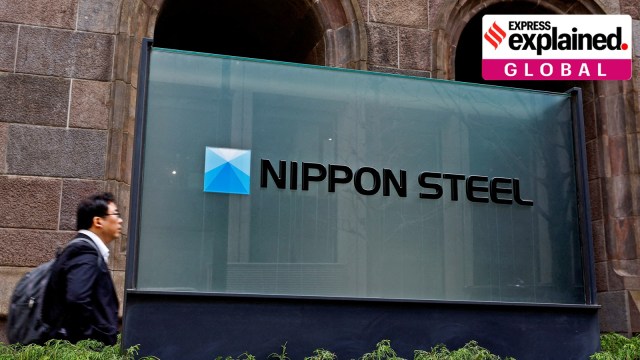Biden blocks Japan firm’s bid to acquire US steelmaker: why this is a shortsighted decision, what could happen now
Joe Biden Blocks Nippon Steel: The takeover of the iconic US Steel by Japan’s Nippon Steel was announced in 2023. There has been bipartisan political opposition to the deal – even though it contradicts the foundational American commitment to free markets and unfettered enterprise.
 Trump said last month that he would not allow the deal to go through. (REUTERS/Issei Kato/File)
Trump said last month that he would not allow the deal to go through. (REUTERS/Issei Kato/File)Joe Biden Blocks Nippon Steel: Less than three weeks before he leaves office, President Joe Biden used his executive power to block the $14.9-billion takeover of US Steel by Japan’s Nippon Steel on Friday (January 3). The reason: “risks to the national security of the United States”.
In a statement, he said, “I am taking action to block this deal. It is my solemn responsibility as President to ensure that, now and long into the future, America has a strong domestically owned and operated steel industry that can continue to power our national sources of strength at home and abroad”.
“For too long, U.S. steel companies have faced unfair trade practices as foreign companies have dumped steel on global markets at artificially low prices, leading to job losses and factory closures in America. I have taken decisive action to level the playing field for American steelworkers and steel producers by tripling tariffs on steel imports from China… Today, the domestic steel industry is the strongest it has been in years,” he added.
The New York Times described Biden’s decision as “an extraordinary use of executive power” and a “departure from America’s long-established culture of open investment, one that could have wide-ranging implications for the US economy”.
The Washington Post, which first reported Biden’s decision, had said the announcement could come on Friday, and would likely face legal challenges from both companies. What is this development in US economic policy, and why does it matter?
The deal and the opposition: What happened in 2023-24
The deal was announced in December 2023 after the iconic Pittsburgh-based company chose Nippon, whose bid was significantly bigger than others seeking to take it over.
US Steel Chief Executive David B Burritt said the acquisition would create “a truly global steel company with combined capabilities and innovation capable of meeting our customers’ evolving needs”.
The announcement was immediately met with political opposition from both Democrats and Republicans. The United Steelworkers union, to which the bulk of US Steel workers belong, pushed back strongly against the proposed takeover by a foreign company. And the White House said the proposed acquisition “deserved serious scrutiny in terms of its potential impact on national security and supply chain reliability”.
Critics of the deal argued that the acquisition of the storied American company, floated in 1901 by J P Morgan and Andrew Carnegie that was, at its peak, one of the biggest companies in the world, could threaten US national security and impact union jobs in Pennsylvania.
Pennsylvania is a key battleground state, which was at the time expected to be crucial for President Biden’s re-election bid. United Steelworkers had endorsed his 2020 presidential run. (Ultimately, Biden would pull out of the race, and Donald Trump would win the 2024 US presidential election.)
Why these arguments present a problem
Commentators had flagged from the beginning that the bipartisan opposition to the deal was shortsighted – and contradicted the foundational American commitment to free markets and unfettered enterprise.
The New York Times report on Friday, before the announcement was made, said Biden’s decision to stop the transaction “could cause foreign investors to rethink the wisdom of acquiring American firms in sensitive industries that are based in politically important states”.
There are four broad issues here.
* First, the question of the “security risk” involved in a “foreign entity” buying an American company:
Nippon Steel is the largest steelmaker in Japan, which is one of America’s closest allies. The US State Department describes the relationship with Japan as “the cornerstone of US security interests in Asia and… fundamental to regional stability and prosperity”.
The alliance, according to the US, is based on “shared vital interests and values, including the maintenance of stability in the Indo-Pacific region, the preservation and promotion of political and economic freedoms…”
The argument for the US national security imperative, therefore, seems difficult to swallow.
* Second, whether the acquisition might harm US Steel and its business prospects:
Nippon Steel, the world’s fourth largest steelmaker, is well-capitalised and could bring more stability to the operations of US Steel.
The acquisition was expected to put the combined entity among the top three steel producers in the world, and create one of the biggest steel companies outside China — thereby restoring some of the iconic American company’s past glory, and advance Washington’s renewed manufacturing push.
While US Steel products are associated with the construction of some of America’s most recognisable structures, the country’s steel industry has struggled to compete in recent decades against foreign companies, including those from China, which now dominates global steel production.
* Third, this was not about to be a hostile takeover of US Steel by Nippon.
The No. 3 American steel producer had been looking for a buyer since August 2023, when it turned down an unsolicited bid from Cleveland Cliffs, the No. 2 steelmaker.
Also, Nippon Steel is not new to America — it has been operating in that country for four decades, starting with a joint venture project with Wheeling-Pittsburgh Steel in West Virginia.
And it had promised to honour all agreements with the union, and carry out no layoffs or shut down plants during the period of the union’s current four-year contract with the company, which continues until September 2026.
* Fourth, the terms of the deal were good.
Nippon Steel would have paid $55 per share, which was a 40% premium excluding assumed debt. Also, US Steel would have kept its headquarters in Pittsburgh, and retained its name.
At the time the deal was announced, The New York Times had quoted analysts at BMO Capital Markets as saying they were surprised by Nippon Steel’s bid, and that the price it had offered was “a bigger surprise” and a “hearty” valuation for US Steel.
What happens now: perhaps a legal battle
Biden made his decision after the Committee of Foreign Investment in the United States (CFIUS) – which has representation from several federal agencies – declined to make a specific recommendation on whether the takeover should be allowed, American media reports said on Friday.
However, CFIUS expressed concern that the deal could lead to a decline in American steel production, and therefore threaten national security. The lack of a formal recommendation cleared the way for Biden to end a transaction that became ensnared in election-year politics, The New York Times report said.
During the presidential election campaign last year, Biden, Vice President Kamala Harris and then Republican nominee Trump had all declared that US Steel should remain under American ownership.
On December 2, the President-elect announced on Truth Social that he would not allow the deal to go through.
“I am totally against the once great and powerful US Steel being bought by a foreign company, in this case Nippon Steel of Japan. As President, I will block this deal from happening. Buyer Beware!!!,” he wrote.
US Steel has indicated it is likely to file lawsuits, including against the Biden administration, if the deal was blocked, CBS News reported, quoting sources. A number of other media outlets also said a legal battle will very likely follow.
However, Reuters, which said Nippon has vowed to fight any decision to halt the deal in the courts, quoted Nick Wall, M&A partner at Allen & Overy, as saying the company would struggle to mount a legal challenge.
“Who are you suing? Are you suing CFIUS? Are you suing the President? Are you suing the broader government? I think it would be near impossible,” the Reuters report quoted Wall as saying.
This explainer draws from an earlier explainer by Anil Sasi that was published on December 22, 2023.
- 01
- 02
- 03
- 04
- 05





































